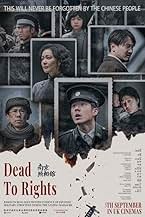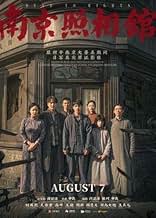Durante la masacre de Nanjing en 1937, el cartero A Chang fingió ayudar a japoneses como fotógrafo mientras ocultaba refugiados chinos y después reveló las atrocidades.Durante la masacre de Nanjing en 1937, el cartero A Chang fingió ayudar a japoneses como fotógrafo mientras ocultaba refugiados chinos y después reveló las atrocidades.Durante la masacre de Nanjing en 1937, el cartero A Chang fingió ayudar a japoneses como fotógrafo mientras ocultaba refugiados chinos y después reveló las atrocidades.
- Dirección
- Guionistas
- Elenco
- Premios
- 3 premios ganados y 5 nominaciones en total
- Dirección
- Guionistas
- Todo el elenco y el equipo
- Producción, taquilla y más en IMDbPro
Opiniones destacadas
This film must be seen in theaters. The world needs to know what Japan did the past . The atrocities they committed in China were mirrored in Malaysia, where they similarly tortured and slaughtered our people. Let us cherish the prosperity and happiness of our nation today, and never forget the lessons of history. We must never forget the lessons of history.
The director showed great restraint in portraying the atrocities committed by the Japanese during their invasion of China. Instead of going the easier route of focusing on amplifying feelings, the director chose to stay focused on storytelling to reenact a glimpse of the Nanjing Massacre accurately as much as possible.
If one could only watch one movie in theaters this summer(maybe even this year), Dead to Rights would be my choice.
If one could only watch one movie in theaters this summer(maybe even this year), Dead to Rights would be my choice.
The movie based on a genuine story told us how ordinary people's lives were short and miserable amid Nanjing occupied in force and brutally raped by the Japanese military force in ww2.
I gave 8/10 is because the movie for some reason does not fully cover some the most brutal scenes in the hisotry. The direct way of facing those scenes is giving those miserable souls lost in the war a peace!
I gave 8/10 is because the movie for some reason does not fully cover some the most brutal scenes in the hisotry. The direct way of facing those scenes is giving those miserable souls lost in the war a peace!
Nanjing Zhao Xiang Guan is a heartbreaking film that exposes the horrors of the Nanjing Massacre. The brutal crimes committed by the Japanese army are depicted with realism, forcing the world to confront this dark chapter. It's a disgrace that such atrocities were ever allowed to happen. This film is a solemn tribute to the victims. A must watch for history and justice. Shameful past , unforgettable part of history.
This is not a movie to be enjoyed. Throughout my watch, I feel my intestines knotted from the blatant display of innumerable brutalities during the Rape of Nanking that were unfathomable strategically and ethically. Not a single body of water in the film isn't red, all bloodied by the 300,000 "swines" that were humans. Laudably, unlike some Sino-Japanese War movies that are purely slogan-calling and hostility-instigating, Dead to Rights has a rather impartial and documentary narrative stance, moving the audience by painstakingly replicating the massacre and letting the plot do the talking. While it's typical in this genre of films to vilify the invaders and traitors, Dead to Rights portrays two brilliant counterexamples: Ito's performative kindness and intrinsic cowardice and Guanghai's suppressed sentiments and deepest despair. With that said, performance of all seven protagonists are spot-on, making the choices, sacrifices and sufferings, though mostly fictional truly believable and resounding. Bravo specifically to Gao Ye, who perfectly captures Yuxiu's change from resiliently hopeful to defenselessly abused to reclaiming justice and avengement, as her powerless tears reflect the most inhumane violations done to countless comfort women. In all, Dead to Rights is a soul-stirring piece of work, but please be prepared for the historical pain it conveys. To intrusion and trampling, I shall retaliate with survival and remembering.
¿Sabías que…?
- TriviaThe film is loosely based on the discovery of a key piece of evidence from the Nanjing Massacre. In 1938, 15-year-old darkroom apprentice Luo Jin secretly compiled photos of the atrocities-taken by Japanese soldiers-into an album and hid it. The album was later discovered by Wu Xuan, another Chinese civilian, who preserved it for years before handing it over to postwar authorities.
- Créditos curiososAs the closing credits came on, a hand puts up black and white photographs of old Nanjing and superimpose it on the same spot of where it was taken in modern-day Nanjing.
Selecciones populares
Inicia sesión para calificar y agrega a la lista de videos para obtener recomendaciones personalizadas
Detalles
Taquilla
- Total a nivel mundial
- USD 632,337
- Tiempo de ejecución
- 2h 17min(137 min)
- Color
Contribuir a esta página
Sugiere una edición o agrega el contenido que falta




























